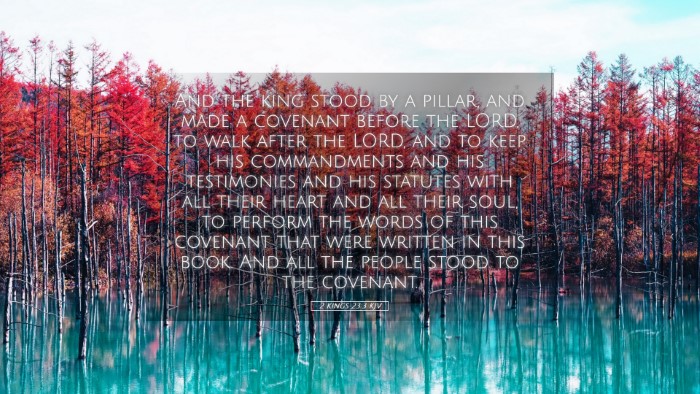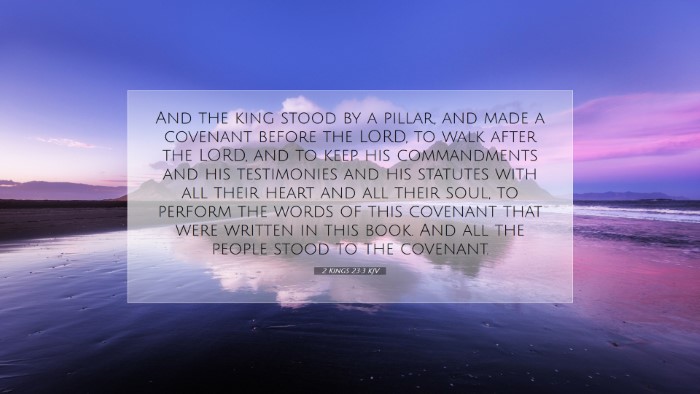Commentary on 2 Kings 23:3
2 Kings 23:3 depicts a pivotal moment in Israel's history, illustrating the people's response to the reforms initiated by King Josiah. In this verse, we witness a collective act of covenant renewal, with the king standing by a pillar and making a solemn covenant before the Lord. This moment is rich with theological significance and historical context, which can be explored through insights from noted public domain commentaries.
Setting the Scene
In the preceding chapters, we see how Josiah, having come to the throne at a young age, discovers the Book of the Law in the temple (2 Kings 22:8). This discovery ignites a profound spiritual awakening and sets the stage for sweeping reforms. Josiah's zeal for the Lord prompts him to eradicate idolatry and restore proper worship, drawing the nation back to their covenantal responsibilities.
Verse Analysis
2 Kings 23:3: “And the king stood by a pillar, and made a covenant before the Lord, to walk after the Lord, and to keep his commandments and his testimonies and his statutes with all their heart and all their soul, to perform the words of this covenant that were written in this book. And all the people stood to the covenant.”
The King's Commitment
King Josiah's act of standing by a pillar symbolizes a place of authority and stability. Similar to the pillars erected by Moses (Exodus 24:4), this act signifies a solemn declaration of commitment not just by the king but also a call for national allegiance to Yahweh. Albert Barnes emphasizes that this moment was not merely ritualistic but rather a serious vow that would shape the nation’s spiritual and social fabric (Barnes, 2 Kings 23:3).
Covenantal Renewal
The essence of the verse revolves around the renewal of the covenant that had been neglected and forsaken. Matthew Henry argues that such renewals were essential in reclaiming the identity of the people as the covenant community. The historical neglect of the Law led to spiritual decay, and this instance serves as a restorative process where the people reestablish their commitment to God’s ordinances (Henry, 2 Kings 23:3).
Heart and Soul Commitment
The language used in the verse highlights a holistic dedication—“with all their heart and all their soul.” Adam Clarke notes that this phrase underscores the need for genuine devotion beyond mere external compliance (Clarke, 2 Kings 23:3). The heart represents the inner affections while the soul signifies life itself, indicating that true worship must engage the entire being.
The Role of the People
Josiah’s covenantal commitment is mirrored by the response of the people: “And all the people stood to the covenant.” This communal agreement not only reflects the influence of the king but also the conscious decision of the people to align their lives with God’s statutes. It marks a collective determination for spiritual renewal. Matthew Henry points out the importance of unity in such commitments—the heart of the nation was once again turned towards God, signaling hope for spiritual revival (Henry, 2 Kings 23:3).
Lessons and Applications
-
Covenant Renewal: The significance of renewing our commitment to God’s covenant remains vital for believers today. This verse serves as a reminder that spiritual awakenings often begin with returning to God’s word.
-
Collective Responsibility: Just as the people stood with Josiah, there is a communal aspect to faith. Christian communities today must embrace collective decisions to uphold God’s principles in a world rife with moral ambiguity.
-
Wholehearted Devotion: The call to serve God with all heart and soul challenges modern believers to assess the depth of their commitment. It reflects a holistic discipleship that transcends mere attendance to religious activities.
Conclusion
2 Kings 23:3 serves as a profound call to renewed commitment to God for individuals, communities, and nations. Through the insights gained from public domain commentaries by Matthew Henry, Albert Barnes, and Adam Clarke, we appreciate the importance of this moment in biblical history. As King Josiah led the people in rededicating themselves to God, we too are invited to reflect on our own covenants and renew our commitment to live in accordance with God’s commands. In doing so, we foster not only personal spiritual growth but also contribute to the collective witness of the church in our world today.


